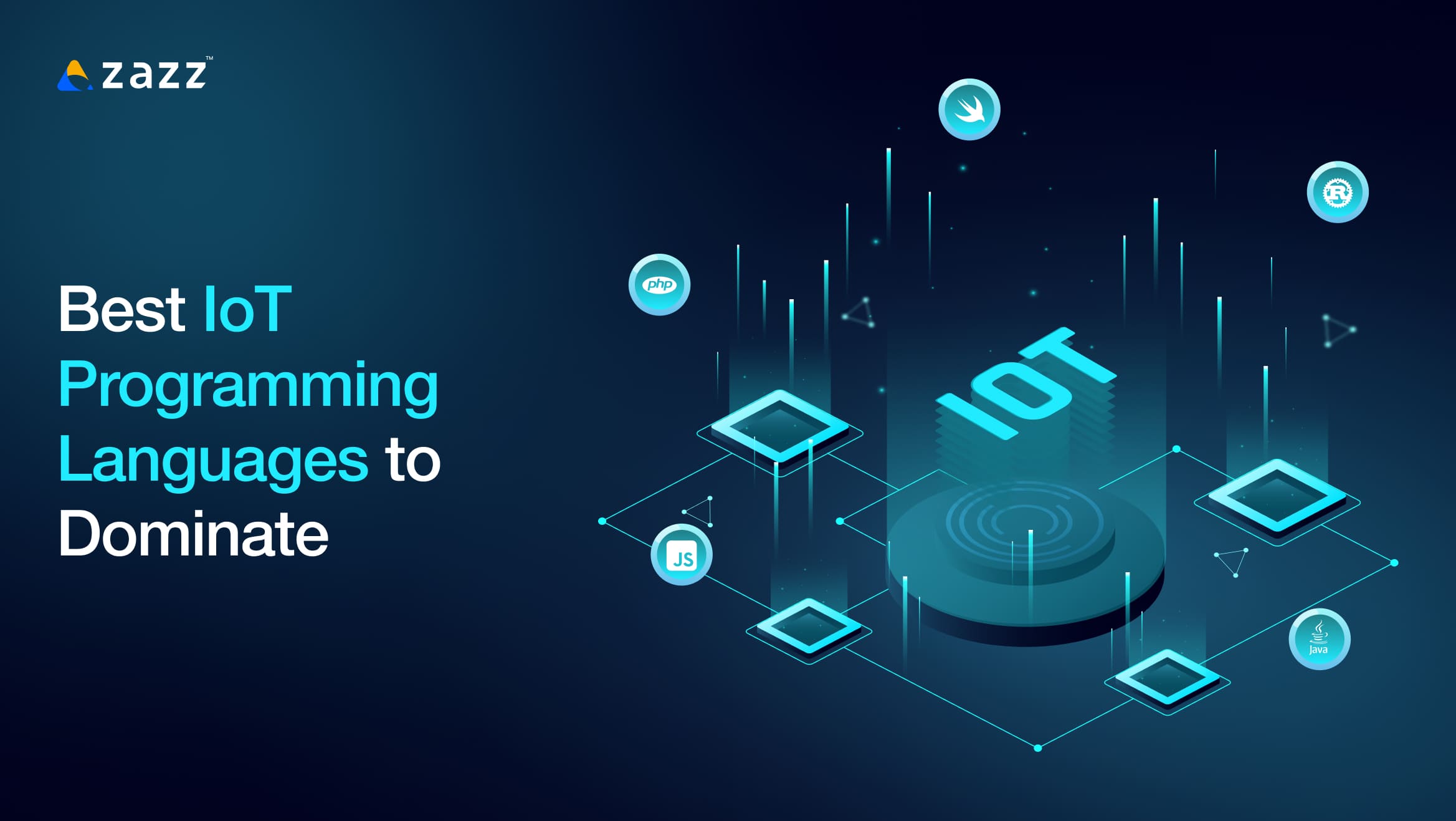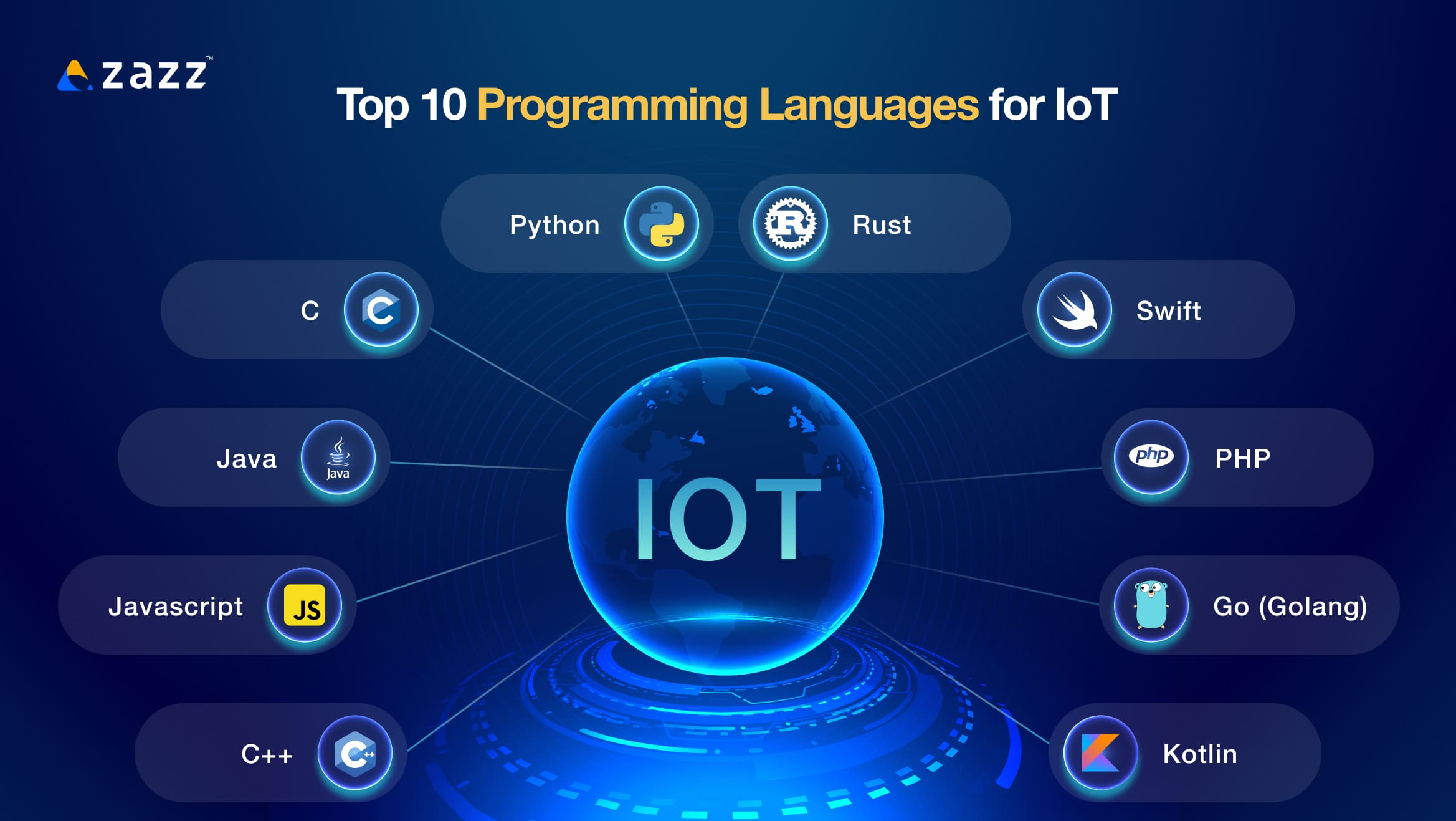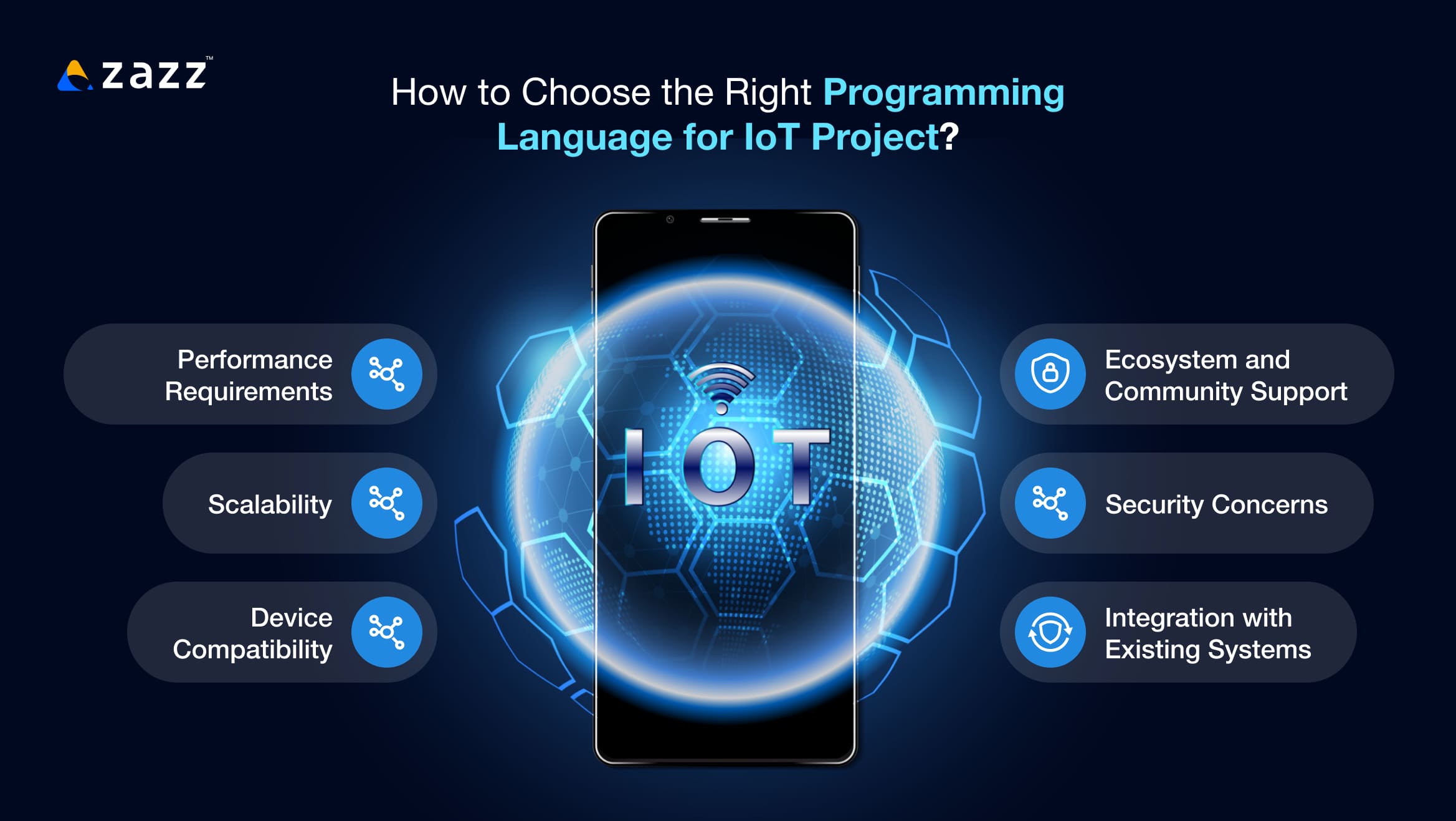
Choosing the right technology for your IoT project is critical—it can make or break the success of the entire endeavor. A poor choice could lead to a system that doesn’t work well with your intended devices, might be slow, or could be hard to set up.
Figuring out which programming language to use for IoT can be tricky and it’s usually best to ask an expert in IoT development. To help you get started, we have put together a list of the top IoT programming languages for 2025. We’ll show you what makes each language special and how they can be used in your projects. So, let’s begin!
What is the Internet of Things (IoT)?
The Internet of Things, or IoT, refers to the network of physical objects—like household devices, vehicles, and even industrial equipment—that are connected to the internet. These devices collect and exchange data with each other and the internet. By doing so, they can be monitored and controlled remotely.
For example, a smart thermostat in your home is part of the IoT. You can adjust the temperature from your smartphone, even when you’re not home. This thermostat learns your schedule and temperature preferences to optimize your home’s heating and cooling automatically, saving energy and making life more comfortable. And just like smart devices help you save time and effort, using tools or services that do my essay can free up your schedule for more important things—whether it’s working on a project, spending time with family, or just taking a break.
Related reading: IoT Application Development: A Complete Guide
Top 10 Programming Languages for IoT

Several programming languages have become particularly popular in IoT development because they are well-suited for various aspects of IoT systems. Here, we highlight some of the most widely-used ones:
1. Python
Python is the most popular language for Raspberry Pi and is widely used in IoT projects due to its extensive collection of ready-to-use solutions and frameworks. Python serves as a primary scripting language for creating web interfaces for IoT devices, as well as for developing machine learning models and data analysis tools. It’s also favored for its rapid prototyping capabilities.
For instance, Python development is extensively used in smart farming equipment that utilizes sensors to monitor soil moisture levels and climate conditions. This enables automated irrigation systems.
Being platform-neutral, Python can operate across various operating systems like Windows, Linux, and macOS. This flexibility allows developers to write code once and deploy it on multiple IoT devices and systems without facing compatibility issues.
2. Javascript
JavaScript and its runtime environment, Node.js, are essential for developing interactive IoT applications. It’s particularly useful for building dashboard displays that monitor device activities and manage backend services efficiently. Node.js excels in handling asynchronous input/output operations, which allows it to manage multiple data streams at once. This is crucial for IoT devices that constantly generate and send data.
Moreover, JavaScript’s non-blocking architecture keeps applications responsive and quick, even when handling many tasks simultaneously. This makes it an excellent choice for real-time applications in the IoT space, such as smart home controls, where quick data processing and user interaction are important.
3. Java
Java is highly valued for IoT applications because it works seamlessly across different devices, thanks to its platform-independent nature. This means you can write your application once and run it anywhere, which is especially beneficial for systems that need to operate on various types of hardware.
Java’s robust security features significantly lower the risk of vulnerabilities, which is critical for maintaining the integrity and safety of IoT systems. Its extensive collection of libraries provides developers with ready-to-use code for almost any functionality, saving time and effort in development. Additionally, Java’s automatic memory management helps prevent memory leaks and errors that could cause applications to crash.
4. C
C is a vital programming language for working directly with the hardware in IoT devices. It lets developers write code that controls microcontrollers and sensors very closely, giving them exact control over how the device’s resources are used and how it performs. This is especially important for devices that need to run efficiently with limited power or processing capacity.
C is perfect for embedded systems, which are small computers built into devices to perform specific functions, like in smartwatches or home automation systems. Because it allows for efficient use of resources, this IoT programming language is widely used in situations where performance and low overhead are crucial.
5. C++
C++ builds on the strengths of C by adding object-oriented features, which allow developers to create systems with modular, reusable components. This is especially beneficial for large IoT projects that involve complex designs, as it helps organize and manage the code more effectively. By using C++, developers can break down their projects into smaller, manageable pieces that can be developed, tested, and maintained separately.
Like C, C++ operates close to the hardware, ensuring efficient performance. This is particularly important for IoT applications that need to process data quickly and accurately, such as in real-time monitoring systems or devices that control machinery.
Related reading: 10 Best IoT Tools to Consider
6. Go (Golang)
Developed by Google, Go, also known as Golang, is praised for its simplicity and efficiency. It supports concurrent programming, allowing it to perform multiple operations simultaneously. This capability makes it ideal for networked applications and servers. Go is particularly effective for building scalable network servers and robust data pipelines crucial for IoT systems.
Its comprehensive standard library and its capability to efficiently manage multicore and networked systems are why more IoT developers are choosing Go. This language facilitates the rapid development of applications that can handle large volumes of data and high traffic with ease, which is crucial for IoT environments where reliability and speed are key.
7. Rust
Rust is designed to provide memory safety without the need for runtime garbage collection, which can often slow down system performance. This makes Rust very effective for high-performance IoT applications that demand both safety and speed. Rust’s advanced type system and ownership rules help to prevent common bugs found in other languages that could lead to system failures.
These features allow developers to build reliable and secure programs for IoT devices that often have limited resources. Rust is increasingly becoming the preferred choice for industries that prioritize reliability, such as automotive or smart home technologies.
8. Swift
Originally developed for applications within the Apple ecosystem, Swift has now extended its capabilities to IoT. It is known for supporting the development of fast and secure applications, which is important for IoT devices that interact directly with users, like wearables and home automation tools. Swift’s syntax is clear and concise, making it easier for developers to write efficient and understandable code. The fast compilation time of Swift aids in quicker testing and deployment, which is valuable for IoT development where reducing time to market is important.
Swift also integrates smoothly with existing Apple infrastructure, providing an advantage for developers creating IoT applications designed to work seamlessly with iPhones, iPads, and other Apple devices.
9. PHP
PHP, although not traditionally linked with IoT, is increasingly being used, particularly for server-side scripting in IoT applications. It is well-suited for developing web server applications that gather, analyze, and display data from IoT devices. An example of this is in environmental monitoring systems, where PHP serves as the backend for collecting data from sensors that measure factors like air quality, temperature, and humidity.
PHP’s extensive standard library and its easy integration with databases are major advantages for IoT applications that require frequent database interactions. This makes PHP development a practical choice for managing data-heavy applications where information needs to be continuously updated and retrieved.
10. Kotlin
Kotlin is a modern language that operates on the Java Virtual Machine (JVM) and works seamlessly with Java code. This compatibility makes Kotlin an excellent choice for IoT applications that need to function across different platforms.
Kotlin’s straightforward syntax and emphasis on safety features like nullability and immutability make the development process easier and reduce the likelihood of errors in complex IoT applications. Its ability to prevent common programming mistakes helps ensure that IoT applications are stable and secure.
Related reading: Internet of Things: Threats and Security Challenges to Overcome
How to Choose the Right Programming Language for IoT Project?

Choosing the right programming language for an IoT project is crucial to its success. Here are five key considerations to guide your selection:
Device Compatibility
Assess the types of devices involved in your IoT project. Different languages have different levels of support for various hardware. For example, C and C++ are ideal for low-level programming on constrained devices like microcontrollers due to their efficiency and control over hardware.
Performance Requirements
Consider the performance needs of your application, especially if it requires handling real-time data or operating under strict latency requirements. Languages known for their performance in real-time environments, such as C++, might be more suitable.
Scalability
Think about the potential growth of your IoT system. Choose a language that can scale smoothly as your network of devices expands. High-level languages like Java or Python are beneficial for their extensive libraries and frameworks that support scalability.
Security Concerns
Evaluate the security implications of your project. For IoT devices, which are often targets for cyber-attacks, choosing a language that supports robust security measures and offers tools for encryption and secure data transmission, like Java, is crucial.
Ecosystem and Community Support
Opt for languages with a strong ecosystem and a supportive community. A well-supported language with a plethora of libraries and development tools can significantly speed up development and provide effective problem-solving resources. Python and JavaScript, for example, offer vast communities and comprehensive frameworks and libraries suited for IoT applications.
Integration with Existing Systems
If the IoT system needs to integrate with existing infrastructure, choose a language that can easily connect with other systems. For example, if your existing infrastructure is based on the Java ecosystem, using Java for the IoT components might simplify integration.
Related reading: IoT in Healthcare Indstry
How Can Zazz Help You Pick the Best Language for IoT Development?
Selecting the right programming language for an IoT project can be a complex decision that influences the success of the project. Zazz can assist in this crucial step by providing expert guidance based on years of experience in IoT development. Here’s how Zazz can help:
Consultation and Strategy
Zazz offers consultation services to understand your project requirements thoroughly. Our experts analyze the specific needs of your IoT deployment, including device compatibility, performance requirements, and security concerns.
Expertise Across Languages
We have a team of developers proficient in all major IoT programming languages, from Python and JavaScript to Java and C++. This wide-ranging expertise allows us to recommend the best language suited to your project’s needs.
Security Assurance
With a strong emphasis on security, Zazz ensures that the chosen programming language and the corresponding frameworks enhance the security of your IoT systems, protecting them against potential cyber threats.
Related reading: IoT Transforming Hospitality Industry
Wrapping Up!
Choosing the right programming language is crucial for the success of your IoT projects. The programming language you pick affects how your applications perform, scale, and secure user data. As the IoT market grows, making informed choices becomes even more important for staying competitive.
At Zazz, we understand the intricacies of IoT development. Our team is experienced in a wide range of programming languages and can guide you in selecting the most suitable one for your specific needs. So, contact us today to harness the full potential of modern IoT programming languages and elevate your technological capabilities.
Frequently Asked Questions
Key factors include device compatibility, performance requirements, scalability, security needs, and the ability to integrate with existing systems.
The programming language determines how well you can implement security features such as encryption and secure data transmission, which are crucial for protecting IoT devices.
Selecting a language that doesn’t align with the technical requirements or future needs of the project can lead to performance bottlenecks, security issues, and scalability problems.
IoT systems often need to scale from a few connected devices to thousands. The chosen language should support efficient scaling to accommodate growing network demands without performance degradation.
Zazz specializes in creating custom integration solutions that ensure new IoT applications work seamlessly with your existing infrastructure, enhancing functionality without disrupting current operations.
Recent Articles
Table of Content 1. Data Engineer vs. Data Scientist: Understanding...
Table of Content 1. What is the Carnival in Brazil?...
Table of Content 1. What is IT Staff Augmentation? 2....












